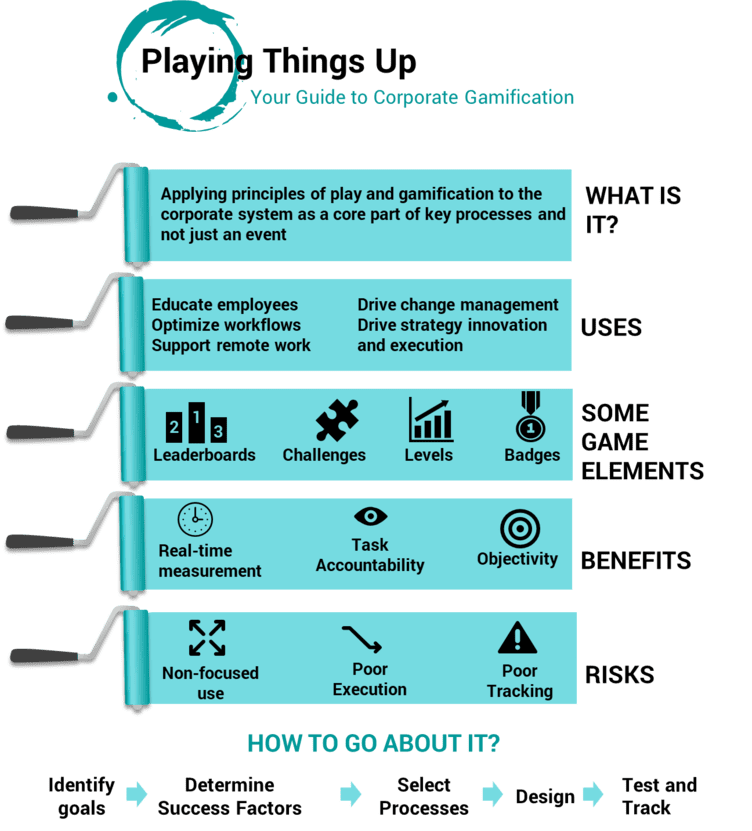“Play” seems to be gaining increasing attention in the corporate world today. Unlike the past popular notions of work that prohibited play, modern and forward-thinking organisations have all infused elements of play and social interaction into work experiences. Some popular reasons for this are to blend the on-the-job experience, increase the employee value proposition and foster team building.
These seem like logical reasons to play, don’t they? Absolutely! The reasons stated are important dynamics that must be considered to drive employees. However, the concept of play has been kept as a treat or side dish instead of being infused into every element of work to serve up the perfect cocktail.
Research has been carried out by several individuals, firms, and research institutes on this topic. These studies have cumulatively found evidence that playing at work is linked to less fatigue, higher critical and creative thinking, job satisfaction, improved performance and learning and development. The several upsides of play go far beyond the individual. It has also proven itself as an effective method of organisational development, change management and corporate disruption.
Before diving into the crux of playing your way through work, the concept of “Play” can subtly be defined as a highly interactive, enthusiastic series of activities or elements deliberately applied to the job context. In one phrase, Corporate Gamification.
Corporate gamification involves leveraging popular principles of gaming and play including but not limited to immediate needs for gratification, competitiveness, feedback, monitoring, levelled challenges, goal setting, art, music, colour, support and now digitisation. Consider the world of gaming and the “new normal”; they are not very different anymore. They are digitally inclined, virtual teams with challenges and goals. The relevance of this is, therefore, gradually leaving the contemporary or corporate elite and becoming urgent for the new virtual world of work.
While many have indulged in several meetings where everyone conveniently keeps their camera off, corporate goals and culture are becoming as distant as the individuals involved and many are waiting for that big opportunity to “bring everyone together” for some form of engagement. However, if we can enjoy virtual games and remain focused on winning and as connected to the other player we’ve never met, we can create a system that works and remain connected to our companies and our collective goals.
Remember that workplace games are not the cure for low productivity and corporate gamification is not a game. It is the application of gaming principles to work. Without breaking the bank, here are a few ways we can infuse corporate gamification to our strategies to work:
Focus on the user experience:
We don’t all enjoy the same games so before you start, define your goals, understand your user outcomes, make sure it is fun, and try out a prototype before you hit your corporate gavel and say “go”.
Play with the game elements:
By converting some tasks to challenges, creating leaderboards and putting something worth winning at the finish line, our natural competitive spirits will push everyone on the team to strive for success. Guess what? Job done!
Learning is a win-win:
Trainings have been one of the easiest things to gamify so jump on it and let it be one of your fast tricks to get people in the zone. This is the period where several companies need talent to wake up. So find a partner with the perfect learning solution and convert everything from corporate policies to daily skills to a virtual simulated experience. For one, the e-class can’t be silent anymore, and you are assured of its real-life hands-on experience.
Team building can be virtual:
While it has been overused as an end of year party title, team building sessions have depth when planned properly, and yes, you can go virtual. By deliberately focusing on the high-level goals, these sessions are tailored to the minutest detail and go from being the party planner’s special to an executive tool for growth.
Measurement is magical:
We often fail not because we never started, but because we failed to measure our progress. Imagine if all the game technicians took a nap? That was rhetorical. To make this process work, there are several levels of measurement that must exist to track, monitor, manage and improve the system. It is a highly iterative process, and that is the best way to keep it functional, consistent, and effective.
There have been a lot of topical hints to the extremely broad concept of corporate play, and this article is just a tidbit to tickle your mental palates. To really succeed in the dynamic, unpredictable world of work today, you need to be ready to play. This means opening your minds to the million methods that can make things move, help your business stay relevant and lead the game. If you think deep, it is one sure reason you and your entire organisation need to learn to “Play Things Up”.
Written by:

Feranmi Owolabi-Okojie
Senior Consultant

